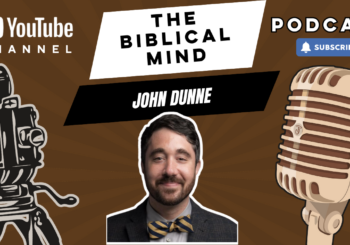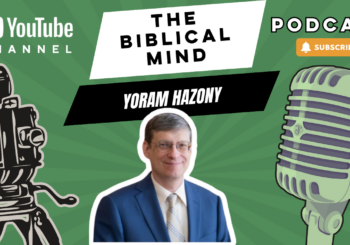Part of the Purifying Ourselves: Moral Formation in the Bible series
Embodying the Kingdom While Facing Mental Health Challenges
In the book of Luke, the first thing we learn about the Kingdom is that it is good news. The second thing we learn is that it is for the poor, the hungry, the excluded, and the sad. The poor have a special claim on it; the hungry are filled; the excluded are included in rejoicing and honor; the sad will laugh.
Enjoying this article? Read more from The Biblical Mind.
How exactly is this good news for those who are sad? I have to admit that this text has sometimes felt like cold comfort to people whom I have known who suffer from mental illness. Yes, we will experience joy in heaven, they say, but what is the point of this now? How does the promise of kingdom joy help us in our current distress? Can the hungry feed themselves with promised food?
What follows is my attempt to express how the hope of the kingdom improves our emotional lives. I believe that the kingdom is a vital doctrine for living with mental health challenges. The kingdom does not offer merely abstract promises of future relief. It is a present reality and the narrative framework for understanding our own stories.
The Storied Self
Novelist Patrick Rothfuss writes, “Everyone tells a story about themselves inside their own head. . . . That story makes you what you are. We build ourselves out of that story.” Rothfuss expresses an observation as ancient as Augustine (Confessions 11.22, 38) and as recent as psychologist Dan McAdams (The Stories We Live By). The observation is this: our sense of our “life” or “identity” is a judgment that we make of our remembered past and our expected future. We understand ourselves by the story we construct, and we come to live that story.
McAdams observes that we tell “redemption” and “contamination” stories. Redemption stories go from bad to good; contamination stories go from good to bad. In ancient Greece these were called comedy or tragedy. The hope of the announcement of the kingdom is the assurance of what sort of story we are living. Ours is a redemptive comedy, not a tragedy. When it seems to me that my story is a tragedy, the news of the kingdom flips my story. I may weep now, but one day I will laugh.
But it is one thing to know this intellectually, and it is another to internalize it bodily. How can we embody this story? How can we feel it in our bones?
The problem has two layers. First, there is the problem of narrative cohesion. What possible connection can there be between my suffering and however God should choose to reward me for it at some future time? And second, there is the problem of embodied experiential disconnect. If our emotional lives are powerfully formed by experience, then how can the kingdom be an experienced reality within my body?
The Loss of Wholeness within the Kingdom
The core of the kingdom narrative is blessing (fruitfulness) through relationship with God. When God created humankind, he blessed them and said, “Be fruitful and multiply.” He also provided for this blessing. He made a beautiful garden, well-watered and full of good food and precious stones. He gave us the task of working and keeping the land from which we came, to cultivate its fruitfulness. The man and the woman also cultivated their own bodies toward fruitfulness with children.
The narrative turn of Genesis 3 brings a curse instead of blessing. The man and the woman are exiled from the presence of God, forced to cultivate the ground with toil and frustration, and to bear children with pain. Both the fruit of the ground and the fruit of the womb (Psalm 127:3) are cursed.
Notice the dimensions of the kingdom: upward, downward, sideways, and inward. The upward dimension is severed in exile. The downward dimension is frustrated with hard labor. The sideways dimension is marked by pain (in childbearing) and resentment (Cain and Abel). And when these dimensions are cursed, humankind is full of a grief too deep to bear.
These dimensions are necessary relational constituents for human flourishing—relations to God, self, others, and work. Without these, humans suffer.1Brian Fikkert and Kelly Kapic also highlight these dimensions of human flourishing in Becoming Whole: Why the Opposite of Poverty Isn’t the American Dream (Chicago: Moody Publishers, 2019). The best theory of the cause of mental illness in general is the diathesis stress model, which combines genetic predisposition with a stressful inciting cause (genes plus threat of loss). At the core of mental illness is this languishing awareness of lack of dimensional wholeness.
And with exile comes shame. Cain expresses a shame not present in the garden: “My punishment is greater than I can bear. Behold, you have driven me today away from the ground, and from your face I shall be hidden. I shall be a fugitive and a wanderer on the earth, and whoever finds me will kill me.”
The big question in Scripture is, how will these dimensions be restored? This is the expectation of the kingdom. God renews his blessing on Noah in Genesis 9:1–5 (“be fruitful and multiply”), before humbling a rival kingdom of Babel in 11:1–9. Where Babel was meant to make a name for humanity, Abraham is promised a name from God in chapter 12. The kingdom blessings that Abraham is promised reflect the dimensions of Eden: covenant with God (upward), land (downward), and seed (sideways). God’s blessings bring laughter (Isaac means laughter) to Abraham and Sarah.
This is the same basic structure of the promised blessings of Deuteronomy 28 at the threshold of the promised land. Faithful covenant with God is the channel of blessing.
The bulk of the Old Testament narrative is about the frustration of the covenant and the coming of the curses of Deuteronomy 28:15–57 culminating in the destruction of Jerusalem. Deuteronomy 28 predicts the desolation, even the horror of Lamentations 2:20: “Should women eat the fruit of their womb, the children of their tender care?” Eating one’s children is the ultimate symbol of curse. It is present in the worst stories of the ancient world. It brings together the curse on the man and the woman from Genesis 3. When there is no fruit of the ground to eat, a person is forced to eat the fruit of the womb.
The blessed kingdom has failed. Can curse again be turned to blessing?
Restoring the Blessings of the Kingdom
The major charges against Israel according to Jeremiah are idolatry (2:11–13), injustice (5:1–17), and abusive shepherding (23:1–4). The result was that God’s flock was driven into exile and scattered. But God promises to bring them back so that they again will be blessed. Jeremiah writes, “I will bring them back to their fold, and they shall be fruitful and multiply.” Ezekiel 34:11–12 emphasizes that God himself will be the shepherd. He will restore them to their land, feed them, strengthen them, heal them, give them rest, and bring justice (34:13–15).
So, when Jesus announces the good news of the kingdom, he is announcing himself as that good shepherd (John 10:11) who seeks after his lost sheep (Luke 19:10) to give them rest (Matt 11:28). Just as Isaiah says that God’s servants shall eat, rejoice, and be blessed (Isaiah 65:13–16), so Jesus announces this blessing to those who are hungry, ashamed, and sad. Jesus is announcing and enacting the reversal of the curse across all its dimensions.
The kingdom is not merely spiritual, as if our bodies, our labor, and our relationships have nothing to do with it. It is the announcement of God’s blessing and the reversal of the curse of Genesis 3. We rejoice in God and in his restored blessing. The kingdom is not abstract.
The crucial question is, has the kingdom arrived? What is our scene in this story? Have we arrived in the fullness of the kingdom or are we still in exile? This is critical for those who are suffering from mental illness. Are we suffering because of some sort of personal spiritual failing? Is our suffering conflict after armistice, or slavery after emancipation? What do we make of mental illness, or abuse, or neglect, or childhood trauma?
A Psychology of Already, and Not Yet
Just as Jesus is the promised seed of blessing, so the kingdom is a seed of blessing not fully ripe for harvest. In our scene we experience the kingdom among the kosmos, blessing amid the curse.
But how do we experience this psychologically? Romans 5:12–8 is a crucial text for understanding this. Romans 5:12–21 announces the new kingdom or regime of grace. In Christ, grace reigns for life where sin had reigned producing death. Blessing instead of curse.
Chapter 6 begins to answer the question how this regime becomes real in our bodies. Paul says, “Consider yourselves dead to sin and alive to God” (6:11) and “present your members as slaves to righteousness leading to sanctification.” (6:12, 19). Thought and action, mind and experience both have a role to play (cf. Romans 12:1–2).
Chapter 8 specifies how Jesus Christ delivers us from the body of sin and death (7:24) by condemning sin in his flesh and giving us the Spirit of God, “who raised Jesus from the dead [and] dwells in you. This Spirit “will also give life to your mortal bodies through his Spirit who dwells in you.” The indwelling Spirit is our already. The Spirit who made dead cells come to life is in us. He has the power to reverse brain damage and synaptic wiring.
And yet, does he always do this? Many Christians face a lifetime of managing mental health difficulties, especially in cases like bipolar or schizophrenia. Do people suffer because the Spirit cannot transform us? Do they suffer because their faith is weak?
Romans 8:18–25 reminds us that, even with the Spirit, God allows us still to suffer bodily. The text reminds us that we still experience the agony of the curse. Just as creation is groaning, awaiting its release from the “bondage to corruption” (the curse), so we also groan: “And not only the creation, but we ourselves, who have the firstfruits of the Spirit, groan inwardly as we wait eagerly for adoption as sons, the redemption of our bodies.”
In the already-but-not-yet kingdom, we have the firstfuits of the Spirit, but continue to groan alongside of creation waiting for the redemption of our bodies. Verse 20 reminds us that God subjected creation to the curse in hope, and by this hope we are saved (8:24), because we don’t walk by sight, but by faith. The kingdom is not here in the fullness of blessed experience. It is a taste of a banquet not yet served. Paul writes, “But if we hope for what we do not see, we wait for it with patience.”
The Internal and External Witnesses
But are we left without a witness? The upward dimension of the kingdom is forged and renewed by a New Covenant. Romans 8:26 reminds us that the Spirit also groans interceding for us. The Spirit helps us in our bodily weakness. We have the blessed presence of the Spirit even if that blessing comes through suffering and weakness. God is with us in it.
And we have another external witness of the kingdom along its sideways dimension. Recall that the two most significant charges against God’s people in Jeremiah were idolatry and injustice. When the Spirit comes on the disciples in Acts chapter 2, something very striking happens. The people are reconciled to God, but they are also reconciled to each other. The gospel produced a remarkable unity and mutual reliance. They experienced the justice of care; they held all things in common. No one suffered the degradation of destitution because all belonged to one another.
Romans 12 echoes this sideways (social) dimension of the kingdom. Chapter 12 reminds us that our bodies are located within the body of Christ, in which we are all members. Each of us is to think soberly about ourselves and to recognize our unity and mutual reliance. Love is no mere implication of the gospel, it is the announcement that the good news of the kingdom has come among us (12:9). Nourishing social relationships can be a major factor in alleviating mental health problems, even with disorders assumed to have a strong genetic component.2For example, the causes of schizophrenia and bipolar are unknown. But they still fit within the diathesis-stress model involving a genetic component and stressors. Recent research on schizophrenia has shown the healing benefits of personal relationships. Todd Hall explains, “The predominant thinking, until relatively recently, has been that genes are the main culprit in this disorder, so relationships and talk therapy don’t really help schizophrenia. This thinking is changing as we learn more about the power of relationships to foster health and healing.” Todd W. Hall and M. Elizabeth Lewis Hall, Relational Spirituality: A Psychological-Theological Paradigm for Transformation (Downers Grove, IL: InterVarsity Press, 2021), 86; J.M. Kane et al., “Comprehensive Versus Usual Community Care of First-Episode Psychosis: 2-Year Outcomes from the NIMH RAISE Early Treatment Program,” The American Journal of Psychiatry 173, no. 4 (October 2015), 362–72; Joseph Walsh, “Can Relational Therapy be Appropriate for Clients with Schizophrenia?” Practice: Social Work in Action 28, no. 4 (2016), 267–80. Strong social ties alleviate feelings of shame, destitution, and alienation.
News of Another City
So, how can we embody this story? How can we feel it in our bones? I said that there are two problems. First, there is the problem of narrative cohesion. How do I connect my suffering to the abstract hope? And second, there is the problem of embodied experiential disconnect. If our emotional lives are powerfully formed by experience, how can the kingdom be an experienced reality within my body?
Let me start with the second problem. How does the kingdom become real to us? The answer is the preview of the kingdom story that every local body represents. Who will teach me that I am loved and not forsaken by God? My brothers and sisters who accept and honor me as a fellow member of Christ. Who will show me the pathway to hope? My brothers and sisters who share both joys and sorrows. Who will teach me that my story has hope? My brothers and sisters who are shaped by the biblical story, especially older members who have gleaned wisdom by walking with God amid suffering.
So, the answer to the first problem becomes clearer. God has graciously given us the firstfruits of joy and blessing, the firstfruits of the kingdom. The larger narrative context for suffering is that God has subjected all of creation to futility. But he has done this “in hope” (Rom 8:20); we are also saved in or by hope (8:24). We do not need to fully understand the great mystery of suffering (or even my particular suffering) to see the stunning beauty of tenacious hope.
It is the presence of co-sufferers that teaches us to embrace this hope with courageous faith. Angela Williams Gorrell calls these people our “cloud of witnesses” (The Gravity of Joy). Our cloud of witnesses are those who walk alongside us sharing suffering and joy. We share suffering by the slow process of imagining what it is like to suffer mental illness. And by sharing the suffering in this way we can help sufferers to entrust themselves to the author and perfecter of our faith (Heb 12:2). In return sufferers can teach us to be poor in spirit. We teach each other to see the story that we are living with the eyes of faith.
We are assured by this faith that the universe was created by the Word of God, and that as exiles and strangers on the earth, we seek a heavenly city that God has prepared for us. As citizens of that city, of this kingdom, we look with faith toward a banquet we have only tasted.
End Notes
1. Brian Fikkert and Kelly Kapic also highlight these dimensions of human flourishing in Becoming Whole: Why the Opposite of Poverty Isn’t the American Dream (Chicago: Moody Publishers, 2019).
2. For example, the causes of schizophrenia and bipolar are unknown. But they still fit within the diathesis-stress model involving a genetic component and stressors. Recent research on schizophrenia has shown the healing benefits of personal relationships. Todd Hall explains, “The predominant thinking, until relatively recently, has been that genes are the main culprit in this disorder, so relationships and talk therapy don’t really help schizophrenia. This thinking is changing as we learn more about the power of relationships to foster health and healing.” Todd W. Hall and M. Elizabeth Lewis Hall, Relational Spirituality: A Psychological-Theological Paradigm for Transformation (Downers Grove, IL: InterVarsity Press, 2021), 86; J.M. Kane et al., “Comprehensive Versus Usual Community Care of First-Episode Psychosis: 2-Year Outcomes from the NIMH RAISE Early Treatment Program,” The American Journal of Psychiatry 173, no. 4 (October 2015), 362–72; Joseph Walsh, “Can Relational Therapy be Appropriate for Clients with Schizophrenia?” Practice: Social Work in Action 28, no. 4 (2016), 267–80.
Image created by Rubner Durais
Did you enjoy this article? Check out The Biblical Mind podcast.





